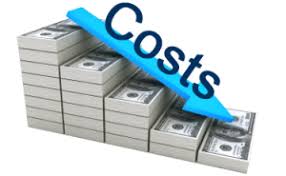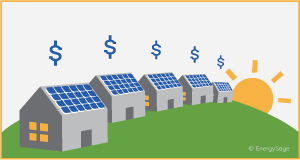Contrary to popular belief, net zero-energy homes offer exceptional affordability and sustainability when compared to their traditional counterparts. To understand this, you need to look not just at the cost of the home as built, but the total cost of ownership.
Net Zero Energy Homes are built to high energy efficiency standards and are combined with systems like active solar. These homes do cost more to build. Some sources say the added cost is 5-10% more than a traditional code-built home. The Rocky Mountain Institute recently released new data indicating that the cost differential is narrowing. They specifically state, “The margin is closing due to performance improvements in the building shell and heating equipment. Zero energy ready homes cost 4% more than a code-built home and the addition of solar panels brings the increased cost of a net zero energy home to 8%.”
The increased price for these homes is recouped over time. Net Zero Energy homeowners have lower utility bills and these homes cost less to maintain. When you look at these homes from this perspective, it refers to the total cost of ownership. While the price tag may be higher, because the costs are lower over time and energy prices rise over time, owners of net zero energy homes come out ahead.
Little to No Energy Costs

Net-zero homes use renewable and sustainable energy, like active solar, to power appliances, outlets, lighting, and more. In turn, homeowners avoid utility bills beyond the minimal charge to be connected to the grid for back-up power. Additionally, according to the Zero Energy Project, homeowners of net zero energy homes have lower operational costs. Overall, owning a net-zero home can completely offset an entire year’s worth of electricity expenditures.
Reduced Maintenance Costs

Over time, ongoing maintenance expenditures can add up, costing homeowners thousands of dollars. These include radon-mitigation spending, mold removal, structural damage, and more. Zero-energy homes, on the other hand, use state-of-the-art, durable materials that reduce and even eliminate many of the issues that traditional homeowners face. When combined with other attributes, “even when zero energy homes cost 4 to 8% more than a comparable standard home, they will cost less to own.” Homeowners can save thousands by avoiding heavy maintenance costs alone.
Higher Resale Valuations

Net zero energy homes are a good investment. Because they are built to very high standards, these homes hold their value. Homes with Home Efficiency Ratings (Hers) can sell for at least 2% more in value. Net Zero Energy Homes have Hers scores of “0”. These homes add 3-5% more in value over conventional homes.
The Solar Energy Industries Association states that, “homes with solar systems, on average, add $15,000 in value.”
Zillow’s research indicates that adding solar does increase the value of a home. Not only is the demand for highly energy efficient homes increasing, “the installation of solar panels not only reduces monthly energy bills, it can potentially increase the homes value by 4.1% compared to homes without solar.”
Should a homeowner decide to sell their net zero-energy home, they can expect a higher ROI than traditional homes. That’s because the home’s construction methods and energy-saving systems and solar panels are factored into the price at the time of sale. According to the Zero Energy Project, “increasingly buyers are looking for homes that are airtight and well-insulated with low energy bills and, increasingly, realtors are finding that energy efficiency features positively affect the value of a home.” Subsequently, prospective buyers associate zero-energy homes with high quality and savings, driving the resale price higher for sellers.
Valuable Tax Incentives
Ask any homeowner, and there’s a high likelihood that taxes are one of their most significant ongoing expenses. In an effort to encourage environmentally responsible home building, states like North Carolina feature exclusive opportunities like solar rebates from Duke Energy, lower interest loans, and various city, town, and federal rebate and tax credits. As a result, individuals who build net-zero houses may qualify for multi-thousand dollar savings. The best source for finding these incentives is DSIRE, the Database for State Incentives for Renewables and Efficiency.
Jodi Bakst, Broker Owner of Real Estate Experts, is known for her knowledge of green, high performance homes. Real Estate Experts is proud to announce its first development project; Array, North Carolina’s first 100% net-zero energy community located in Orange County North Carolina. For detailed information about this 12-lot neighborhood with 56% open space, a beautiful pond, walking trails and a community garden, visit the Array website.
If you’re interested in building a sustainable home, please reach out to Jodi Bakst by emailing [email protected] or calling (919) 697-5014.
Thank you for reading, and we look forward to hearing from you!

